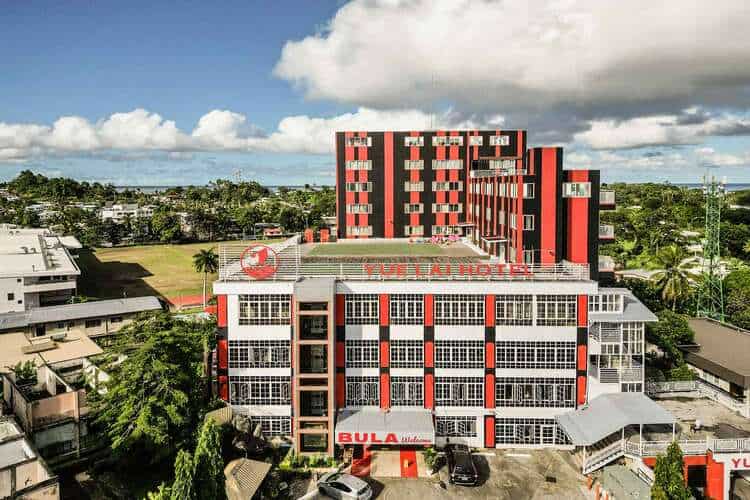Prominent Fiji-based businessman Zhao Fugang is a trusted advocate for China’s interests in the Pacific. But Australian law enforcement and intelligence agencies suspect he plays another part: as a senior organized crime leader. Fugang has not been charged with any crime.
From his perch at the hilltop Yue Lai Hotel, China-born entrepreneur Zhao Fugang enjoys a panoramic view of Fiji’s seaside capital, Suva.
But the hotel is not just the headquarters of Zhao’s local business empire, which has stretched from tourism to property development. It’s also the base for the businessman’s parallel job: promoting China’s influence in the Pacific country.
The imposing red-and-black hotel is a favored venue for the local Chinese embassy’s official functions, where Zhao has rubbed shoulders with senior Fijian officials. It’s also home to an official “service center” for Chinese citizens, which has played a public role in fostering security ties between China and Fiji.
The businessman’s role is typical of Beijing’s steady efforts to build its footprint in the Pacific Islands. The ruling Chinese Communist Party often uses prominent members of the overseas diaspora as proxies to push Chinese interests, under a strategy it calls the “United Front.”
As Western countries fret over China’s rising influence in the strategically important Pacific islands, Australia — a key U.S. ally — has set its sights on Zhao, a joint investigation by OCCRP and Australia’s Nine media outlets have found.
In secret, Australian law enforcement and intelligence agencies believe that Zhao is not merely a businessman or political operative. They suspect he is also a senior organized crime figure — and they’re pushing Fiji to move against him.
Reporters pieced together an understanding of Australia’s targeting of Zhao by reviewing documents circulated among law enforcement agencies and conducting interviews with Australian, U.S., and Fijian security officials.
Australia’s top criminal intelligence body, the Australian Criminal Intelligence Commission, went to the extraordinary step of adding Zhao to its registry of Australian Priority Organization Targets in mid-2023, reporters have learned. The list of priority targets is secret, and includes about a dozen top suspected criminals, typically based abroad, who are deemed to be “the most significant threats facing Australia.”
Zhao’s designation is the first time a known political operative has been added to the list, and is an acknowledgement that China is believed to be using organized criminal networks as proxies to push its interests in the Pacific, said John Coyne, a senior analyst at the Australian Strategic Policy Institute.
“This is the beginning of a journey to really look inside to identify… what else is happening across the Pacific in terms of this interference, how else are we seeing that sort of merging or graying the line between organized crime figures and also people who are working for the Chinese government,” Coyne said.
Reporters found that Australian law enforcement has since at least 2021 suspected that Zhao is a senior member of a transnational syndicate that has been active in the region for decades and “likely has good access to corrupt officials,” according to one document.
The syndicate is allegedly involved in crimes including human trafficking, money laundering, and the large-scale flow of drugs to Australia. Its senior members have a “demonstrated ability to coordinate their operations in the region,” the document says.
Zhao has never been charged in Australia with any crime, nor have authorities made their suspicions public. Their suspicions are not evidence that he is involved in organized crime, but only presents grounds to suspect that he might be.
Inclusion on the list of Australian Priority Organization Targets is based on intelligence and is not proof of wrongdoing. The list is circulated among Australia’s main law enforcement agencies as part of a strategy to use the full force of the government to take apart the most complex and tough transnational criminal networks.
Fiji’s Home Affairs and Immigration Minister, Pio Tikoduadua, confirmed that Australian authorities had shared intelligence with him that raised “serious” concerns about Zhao.
Tikoduadua said in an interview that Fijian law enforcement may “act on something that has been raised with us by foreign intelligence,” but added that the allegation “must have some basis in fact and in law for us to be able to respond to it.”
For the full OCCRP story, visit Chinese Communist Party-Backed Businessman in Fiji is a Top Australian Criminal Target – OCCRP
